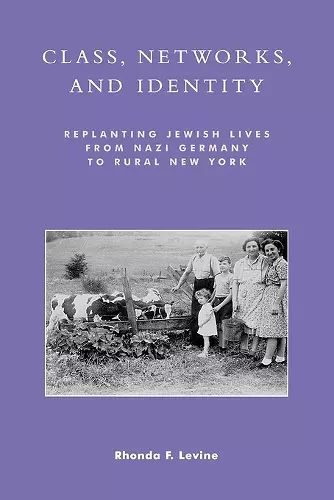Class, Networks, and Identity
Replanting Jewish Lives from Nazi Germany to Rural New York
Format:Paperback
Publisher:Rowman & Littlefield
Published:6th Jun '01
Currently unavailable, and unfortunately no date known when it will be back

This book documents a little-known aspect of the Jewish experience in America. It is a fascinating account of how a group of Jewish refugees from Nazi Germany came to dominate cattle dealing in south central New York and maintain a Jewish identity even while residing in small towns and villages that are overwhelmingly Christian. The book pays particular attention to the unique role played by women in managing the transition to the United States, in helping their husbands accumulate capital, and in recreating a German Jewish community. Yet Levine goes further than her analysis of German Jewish refugees. She also argues that it is possible to explain the situations of other immigrant and ethnic groups using the structure/network/identity framework that arises from this research. According to Levine, situating the lives of immigrants and refugees within the larger context of economic and social change, but without losing sight of the significance of social networks and everyday life, shows how social structure, class, ethnicity, and gender interact to account for immigrant adaptation and mobility.
Levine has done the readers of this book an important service in two ways. She has captured with enormous sensitivity an interesting part of American Jewish history. At the same time, she has provided students of sociology with a rich case study that demonstrates the intersection of social networks and the nature of ethnic identity. * Jewish Book World *
Like a sociological Proust, Levine has rescued an extraordinary story from the edge of oblivion. The tale of how rural German Jews succeeded in escaping the clutches of the Third Reich and reestablished a familiar world in rural New York has the plot elements that a novelist would envy. Yet, remarkably, it also has much to tell us about how immigrants construct worlds of meaning that blend aspects of their former and current homes, while ingeniously exporting the few niches that social and economic structures leave open to them. Levine tells the story with great sensitivity to the human pain and creativity it reveals and with a wonderful eye for the multiple layers of sociological explanation it requires. -- Richard Alba, Vice President, American Sociological Association
Tracing the transplantation of this unexpected occupation, Levine uses her case of refugees from Nazi Germany to deliver all sorts of novel insights into processes of immigration and adaptation, political economy and social identity. History, fieldwork, and theory are fused to produce global ethnography at its very best. -- Michael Burawoy, University of California at Berkeley
A book about Jewish cattle dealers in upstate New York? What will sociologists think to write about next? Yet, it's a wonderful story and an instructive one - about refugees who reconstructed their lives by finding a niche in the American economy and thereby surviving, economically, and culturally. Rhonda Levine doesn't forget that women were half the story. Try it; you'll enjoy it, and you'll learn from it. -- Immanuel Wallerstein, Fernand Braudel Center, Yale University
Sophisticated and satisfying. By depicting the variables of social structure, class, and gender, as well as past group historical experience and contemporary historical reality that need to be considered when trying to understand immigrant socioeconomic adaptation and identity formation, Levine has made a singular contribution to understanding immigrant and ethnic mobility. All academic levels. -- B. Kraut, CUNY Queens College * CHOICE *
Levine's study of German-Jewish cattle dealers is a richly researched and lively report on an unusual ethnic community and an invaluable addition to the fields of ethnic rural sociology and Jewish community studies. Class, Networks, and Identity is a rare gem of a book as Levine follows an ethnic population from its community of origin through emigration and immigration to acculturation and dissolution. -- Herbert J. Gans, Robert S. Lynd Professor Emeritus of Sociology, Columbia University; author of Making Sense of America
A valuable contribution to the ethnography of American Jewry and the sociology of immigration processes. The book is well-written, tightly organized, and accessible, and it will be a useful case study for scholars and teachers in rural sociology, immigration studies, and Jewish studies. * Contemporary Sociology *
A valuable contribution to the ethnography of American Jewry and the sociology of immigration process. Levine has created a valuable picture of an immigrant experience previously neglected by sociological studies. The book is well-written, tightly organized, and accessible, and it will be a useful case study for scholars and teachers in rural sociology, immigration studies, and Jewish studies. * Community, Environment, and Population *
It is an interesting work. * Journal of American Ethnic History *
A well-researched and engagingly presented study. An interesting and useful study that historians and sociologists of immigration should add to their collections. It will also be of interest to students of gender relations and to those seeking to link different-level dimensions of social life in their analysis. * American Journal of Sociology *
ISBN: 9780742509931
Dimensions: 231mm x 145mm x 14mm
Weight: 354g
224 pages